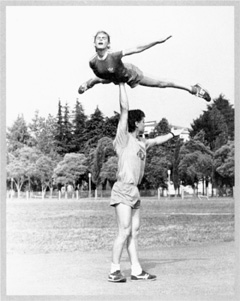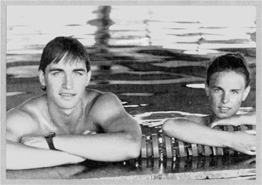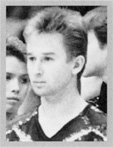My Sergei (9 page)
Authors: Ekaterina Gordeeva,E. M. Swift

We’d begin each day with a morning workout before breakfast. We ran and lifted before lunch. In the afternoon we worked with
Marina. Then we had another workout at 5:00
P.M.
, before dinner.
After a week at home, in July we went to a place higher in the mountains, Sachkadzor, in Armenia, so we could train at altitude.
I always liked these training camps, even though we worked hard. It was pretty in the mountains, and on our days off we had
a chance to go hiking or take picnics. We were there with a lot of different athletes—boxers and gymnasts and handball players
—and in the hallway of the dormitory there was a big calendar that listed how many days were left before the Olympics, summer
and winter.

Pre-Olympic training, summer 1987.
It was a much more intense atmosphere than usual. All the skaters were there, not just those from the army club, and the coaches
were always timing our runs. I was never any good at these races. My times were abysmal. Zhuk was there, too, but fortunately
not as our coach. He still sometimes worked with us in an overseeing capacity, though, and one day I twisted my ankle badly
when he had us practicing the quadruple split twist off the ice after I was already tired.
I told Sergei that anytime he wanted tea or coffee after dinner to come to my room, because I had an electric kettle. Or if
he wanted to eat something sweet. He didn’t come often, but a few times he did, more to drink tea or eat a sweet than to see
me. But it was a good feeling to be able to share these moments with him.

At training camp, getting in shape for Calgary.
If I went to the market to get fruits, I was always sure to get something for him, too. Sergei was too lazy to go to the market,
but sometimes he bought me ice cream in the afternoon, which was wonderful for me. We never went alone, however. Sergei always
had older friends around him, like Sasha Fadeev. But it made me happy to be included.
Sasha was short, very muscular, with strong legs and a strong upper body. His eyes were tiny; his lips were tiny; his hands
were tiny. Everything about him was tiny. But he was very quick when he skated, and he used to jump like a rubber ball. He
was very, very talented, but in my opinion he never fully realized his talent.
Off the ice, however, everything about Sasha was unbelievably slow and relaxed. If you asked him the time, you had to ask
him three times.
“Sasha, do you have the time?”
“Huh?”
“Do you know what time it is?”
“Hmm?”
“What time is it?”
Then he would tell you. When you talked to him, he would be thinking about the last subject when you had moved onto the next
one. He was also stubborn and independent. If everyone went into a restaurant and ordered one type of pizza, Sasha would be
sure to order another type. He was proud to be different.
Yet he was always very, very kind. Sasha used to catch me furrowing my brow when I was listening to him or Sergei. I was so
little that I looked up to everyone, and as I did this my brow became furrowed. He’d use his fingers to smooth the wrinkles
from my forehead. Everyone did this to me. It got to be quite embarrassing.
The next training camp we went to was in Dnepropetrovsk, in the Ukraine, where we trained on the rink where Oksana Baiul learned
to skate. That’s where, for the first time, we skated our Olympic programs. Because it was an Olympic year, the entire federation
watched us to give their approval. I liked the free program Marina had made for us immediately, which was to a medley of music
by Chopin and Mendelssohn. Marina told us we were supposed to be fresh and springlike, to skate as if we were looking at the
blue sky from beneath apple blossoms. That’s why our costumes were sky blue, with sprigs of white flowers sewn over the shoulders.

Sasha Fadeev
The short program was from the opera
Carmen:
“The March of the Toreadors.” Many of the members of the federation thought it was too serious for us, that the music should
be more romantic. Marina, ever the iconoclast, told us not to worry, it would be fine. Still, I couldn’t help but listen to
the comments, and, like a good Gemini, I worried about this program one day and was confident about it the next. We changed
the beginning many times before the Olympics, but kept the music. The program required us to act the part of toreadors marching
before a bullfight, displaying all the beauty, grace, and pageantry of that passionate event.
We bypassed the early competitions held in North America—Skate America and Skate Canada—so the team doctors could monitor
our health as closely as possible. The Soviet Union’s sports machine left very little to chance. That was okay. The goal,
we knew, was the Olympics; and as the Games approached, everything became a little more stressful, a little more intense.
In mid-November we won an event called the Moscow News. Afterward there was an exhibition, and while practicing for this exhibition,
Sergei caught his blade in a soft rut in the ice. While holding me aloft in a star lift, with my hands and legs fully extended
outward, Sergei dropped me. The first part of my body to hit the ice was my forehead.
I didn’t feel any pain at first, then my entire head felt like it was splitting apart. Someone picked me up, I think it was
Leonovich, and then I blacked out. I came to in the first-aid room, and I was driven to the hospital.
I ended up staying for six days. I’d suffered quite a serious concussion. I lay there worrying about missing practice and
the Olympics, and I was mad at Sergei because I thought this fall was his mistake. Then there was a knock on the door, and
it was Sergei.
He was carrying a dozen roses, and he was very, very upset. It was the first time he’d given me flowers. I was surprised,
even happy to see how distressed he was. Many boys—and I’d trained on the ice with a few—would have been happy to drop
their partners on their head. Spending so much time together training can lead to intense personality conflicts, and successful
pairs are not necessarily friendly. But Sergei was so sad that I began to feel sorry for him. He stayed in the hall after
giving me the roses, and it scared him when they wheeled me out of the room in my bed so I could go have some tests. That
night he had to return to the Moscow News exhibition to pick up our trophies, and the pictures in the newspapers the next
day showed him looking quite sad. His obvious distress had a buoyant effect on my spirits. Sergei visited me three more times
before I got out.
I had another visitor, too, who brought me flowers. He was a friend from school, Valery Kharlamov, the nephew of the famous
ice hockey player of the same name. I only mention this because he was the only other person in my life who could have passed
for a boyfriend, although that was because he wanted to be my boyfriend, not because I wanted it. I never had very fond feelings
for him, although I did go with him to a movie once. Sergei only saw us together one time, and it was interesting, because
he got very upset. Valery and I were sitting together on a bus on the way to my practice, and Sergei also got on this bus.
I was embarrassed when he saw us. And afterward, Sergei didn’t want to practice. He began teasing me, saying, “Maybe you have
to go already because someone is waiting for you.” He was definitely jealous. It was a bad day for both of us.
After getting out of the hospital, it was another week before I was allowed on the ice, and Sergei continued to visit me at
home every day. When, at last, I could skate again, I immediately noticed a change in the way he was holding me. He was holding
me tighter, as if he didn’t want to give me a chance to touch the ice. It was like he grew up during this period when we didn’t
skate. I felt more secure. Something had happened in those two weeks, and even I—so focused on skating, so serious about
training and life—realized that his thoughts for me had changed. Before we had been like two skaters. After that, we were
a pair.
Because of the training time I had missed, the figure skating federation told us we didn’t have to compete at the Nationals,
which were held over Christmas, in order to represent the Soviet Union at the Olympics. And that year, for the first time,
my family invited Sergei to celebrate New Year’s Eve with us.
In our family we never used to celebrate Christmas on the twenty-fifth. The thirty-first of December was the big holiday celebration.
On the twenty-eighth or twenty-ninth my father would get up very early in the morning so he could buy the best Christmas tree,
because they brought them from the forest to Moscow during the night. He’d bring it home, and when my sister and I were very
small, my father and mother would wait until we were asleep to set up the tree. Then they would decorate it during the night.
When we awoke the first thing we saw was this magnificent Christmas tree standing in our apartment, beautifully dressed in
ornaments as if by magic.
Once Maria and I were older, though, we also helped in this wonderful project, and on the thirtieth the family decorated both
the tree and the apartment. On the thirty-first my mother and grandmother would start to cook the Christmas meal, maybe fish,
maybe duck. It was something different every year. I liked to help them cook. We’d make cold cuts and salads and cut up exotic
fruits that had been saved especially for Christmas.
We always had a special bag under the tree, which we called the Santa Claus bag. My grandmother sewed this bag, which was
red and white with a big white ribbon on top. It was beautiful. For a couple of days before New Year’s we’d slip presents
into the bag until it was huge. No one was supposed to see you putting the gifts in, so it would look like the bag was growing,
growing, growing. Then at midnight, after drinking champagne and wishing each other happy Christmas, happy New Year, we’d
open the presents.
It was actually my parents’ idea to invite Sergei. I told them no, he wouldn’t come; he had his own friends. But I asked him
anyway. He said he’d try to come, but it was still a surprise for me when he showed up. I thought maybe he’d sit with us for
a while and then leave, but he ended up spending the whole night with us.
He was a little shy at first, because it was his first time with our family like this. It was just Sergei, me, my father,
mother, sister, and grandparents. We had a lot of candles around, and everything was beautiful, because Christmas is the most
beautiful holiday all over the world. For a gift I gave Sergei a needlepoint picture I’d done of a clown with a wide smile
painted on, and little tears coming down his face, sitting on a bench feeding the birds. He was very happy and surprised.
This needlepoint is still hanging in his mother’s apartment. But he protested at first, saying, “No, I don’t need a gift.”
Probably because he didn’t have anything for me.
I don’t know where my mother got this idea, but she told us that at twelve o’clock exactly she was going to take an old plate
and drop it on the floor, so it would break into little pieces. Then, before the twelfth toll of the clock, everyone had to
grab a piece and dash off to hide it somewhere in the apartment and make a wish. If someone were to find this broken piece
during the year, they weren’t supposed to touch it, or the wish wouldn’t come true. Even if one of us was cleaning the apartment,
we had to leave the piece alone. So we had to hide them very well.